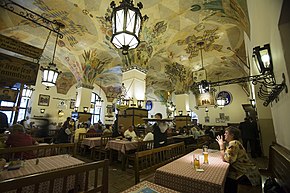| Revision as of 00:29, 10 July 2020 editReywas92 (talk | contribs)Extended confirmed users, Page movers, Pending changes reviewers, Rollbackers81,253 edits AFD closed as speedy keep (XFDcloser)← Previous edit | Revision as of 17:22, 10 July 2020 edit undoNorthamerica1000 (talk | contribs)Autopatrolled, Administrators708,032 edits - {{Beer-stub}}. Start class now.Next edit → | ||
| Line 40: | Line 40: | ||
| *{{Commonscat-inline|Beer halls}} | *{{Commonscat-inline|Beer halls}} | ||
| ⚫ | {{Drinking establishments}} | ||
| {{Bartend}} | |||
| {{DEFAULTSORT:Beer Hall}} | {{DEFAULTSORT:Beer Hall}} | ||
| ] | ] | ||
| ] | ] | ||
| ⚫ | {{Drinking establishments |
||
| {{Beer-stub}} | |||
Revision as of 17:22, 10 July 2020
For the 1923 event, see Beer Hall Putsch.
A beer hall (Template:Lang-de) is a large pub that specializes in beer.
Germany


Beer halls are a traditional part of Bavarian culture, and feature prominently in Oktoberfest. Bosch notes that the beer halls of Oktoberfest, known in German as Festzelte, are more properly termed "beer tents", as they are large, temporary structures built in the open air. In Munich alone, the Festzelte of Oktoberfest can accommodate over 100,000 people.
Bavaria's capital Munich is the city most associated with beer halls; almost every brewery in Munich operates a beer hall. The largest beer hall was the 5,000-seat Mathäser near the München Hauptbahnhof (Munich central train station), which has since been converted into a movie theater.
The Bürgerbräukeller, located in Munich, was a particularly prominent beer hall in Bavaria that lent its name to the 1923 Beer Hall Putsch, an attempted Nazi coup led by Adolf Hitler. The Bürgerbräukeller had long been a Nazi meeting place, and was the starting point of the 1923 coup.
United States
American beer halls became popular in the mid-19th century, following a wave of immigration from Germany to the United States. They became an alternative to the American-style tavern.
St. Louis, Missouri is home to a number of beer halls, some of which seat several hundred persons. Hofbräuhaus has eight franchised beer halls in the United States.
The Loerzel Beer Hall was built around 1873 in Saugerties, Ulster County, New York, and was added to the U.S. National Register of Historic Places in 2000. It presently serves as an apartment building.
German brewers who immigrated to Milwaukee, Wisconsin built "hundreds of distinctive taverns and beer halls", and also built and established large outdoor beer gardens.
See also
- Beer Hall Boycott – a female-led national campaign in South Africa of boycotting municipal beer halls
- Brewpub
- Hofbräuhaus
- List of public house topics
- Rathskeller
 Beer portal
Beer portal Germany portal
Germany portal
Notes
- "The Mathäser billed itself as "the largest beer hall in the world" with over 7000 seats"
References
- Steves, Rick. "Munich Madness: Oktoberfest and Beer Halls by Rick Steves". Rick Steves Europe. Retrieved 8 July 2020.
- ^ Bosch, Claudia (2011). "'Ein Prosit der Gemütlichkeit': The German Beer Hall as Place of Cultural Performance". Environment, Space, Place. 3 (2): 97–121 at 97–98. ISSN 2068-9616.
- Gaab, J.S. (2006). Munich: Hofbräuhaus & History : Beer, Culture, & Politics. New York, New York: P. Lang. p. 97. ISBN 978-0-8204-8606-2. Retrieved 8 July 2020.
- Hawthorne, Larry (2005). The Beer Drinker's Guide to Munich. Beer Drinker's Guide to Munich. Hemet, California: Freizeit Publishers. p. 95. ISBN 978-0-9628555-2-8. Retrieved 8 July 2020.
- "Bürgerbräukeller, München – Historisches Lexikon Bayerns". www.historisches-lexikon-bayerns.de. Retrieved 2020-07-07.
- Ruschmann, Paul (2013). "Beer Halls". In Smith, Andrew F. (ed.). The Oxford Encyclopedia of Food and Drink in America (2nd ed.). New York: Oxford University Press. pp. 155–56. ISBN 978-0-19-973496-2. OCLC 781555950.
- Brown, Lisa (10 December 2017). "St. Louis craft brewers expand facilities as competition mounts". St. Louis Post-Dispatch. Retrieved 7 July 2020.
- Brown, Lisa (1 December 2017). "After delays, Hofbräuhaus brewery in Belleville to open in January". St. Louis Post-Dispatch. Retrieved 7 July 2020.
- "National Register Information System". National Register of Historic Places. National Park Service. July 9, 2010.
- Cross, J.A. (2017). Ethnic Landscapes of America. Cham, Switzerland: Springer International Publishing. p. 270. ISBN 978-3-319-54009-2. Retrieved 8 July 2020.
External links
 Media related to Beer halls at Wikimedia Commons
Media related to Beer halls at Wikimedia Commons
| Bartending | |||||
|---|---|---|---|---|---|
| Occupations |  | ||||
| Alcoholic beverages | |||||
| Non-alcoholic mixers | |||||
| Equipment |
| ||||
| Garnishes |
| ||||
| People | List of bartenders | ||||
| Terminology | |||||
| Related | |||||